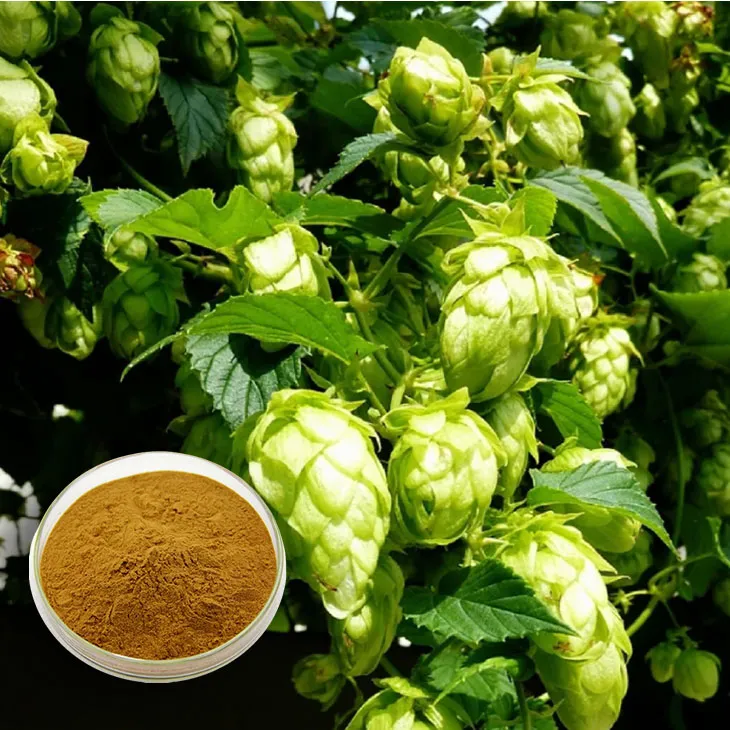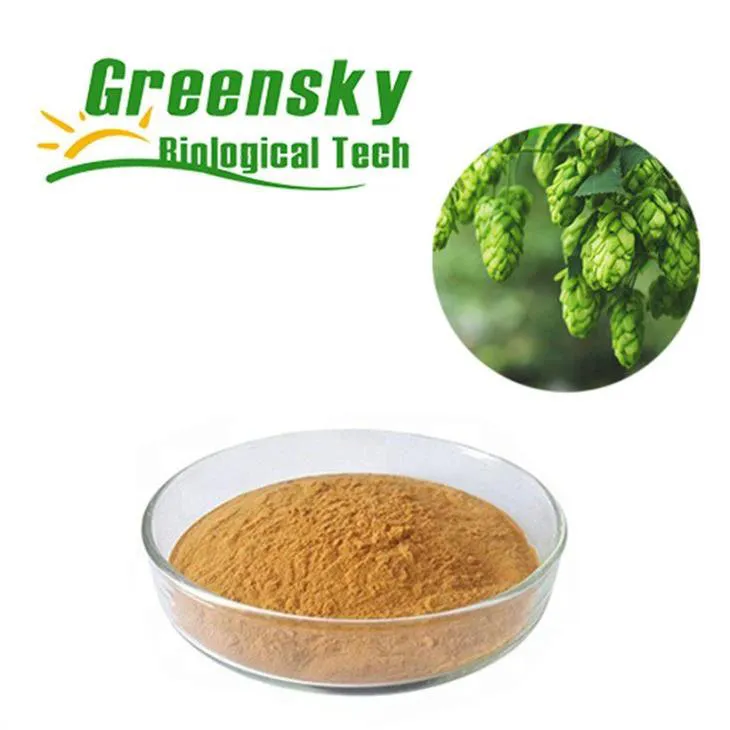- 0086-571-85302990
- sales@greenskybio.com
Do you use hops extracts? Make sure you source from sustainable suppliers!
2024-12-18

Introduction
Beer has been a popular and beloved beverage across the globe for centuries. It is not only a refreshing drink but also a significant part of different cultures. One of the key ingredients in beer brewing is hops, and specifically, Hops Extracts have become increasingly important in modern brewing processes. Sustainable sourcing of Hops Extracts is not just a trendy concept but a crucial aspect that can have far - reaching impacts on various aspects of the brewing business.

The Role of Hops Extracts in Brewing
Hops are the flowers of the hop plant (Humulus lupulus). They contribute to beer in multiple ways:
1. Bitterness
Hops extracts contain alpha - acids, which are responsible for the characteristic bitterness in beer. This bitterness helps to balance the sweetness of the malt, creating a more complex and enjoyable flavor profile. Different varieties of hops can provide varying levels of bitterness, allowing brewers to customize the taste of their beers.
2. Aroma
Besides bitterness, hops also impart a wide range of aromas to beer. These can include floral, citrus, piney, or earthy scents. The essential oils in hops extracts are the source of these aromas, and they play a crucial role in giving each beer its unique and recognizable smell. Aroma - focused hops are often added later in the brewing process to preserve these delicate scents.
3. Preservation
Hops have natural preservative properties. The compounds in hops extracts can inhibit the growth of bacteria and wild yeasts, which helps to extend the shelf - life of beer. In the days before modern refrigeration, hops were an essential ingredient for keeping beer drinkable for longer periods.

Environmental Protection through Sustainable Sourcing
Sustainable sourcing of hops extracts has a direct positive impact on the environment:
1. Conservation of Water Resources
- Hops farming requires a significant amount of water. Sustainable suppliers are more likely to implement efficient irrigation systems. For example, some use drip irrigation methods that deliver water directly to the roots of the hop plants, reducing water waste through evaporation or runoff.
- They may also recycle and reuse water within their farming operations. This could involve treating and re - using wastewater for non - potable purposes such as irrigation, which helps to conserve freshwater sources in the regions where hops are grown.
2. Soil Health
- Sustainable hops suppliers often practice crop rotation. By alternating hops with other crops, they can prevent soil depletion. For instance, growing legumes in rotation with hops can fix nitrogen in the soil, reducing the need for synthetic fertilizers.
- These suppliers also tend to use organic fertilizers and soil amendments. Compost and manure can improve soil structure, water - holding capacity, and nutrient content, creating a more fertile and sustainable growing environment for hops plants.
3. Biodiversity
- Some sustainable hops farms create habitats for beneficial insects and wildlife. For example, they may plant hedgerows or wildflower meadows around the hop fields. These areas can attract pollinators like bees and butterflies, which are essential for the reproduction of hops plants as well as other nearby crops.
- By avoiding the use of harmful pesticides and herbicides, sustainable suppliers also protect non - target organisms. This helps to maintain a balanced ecosystem within and around the hop farms, promoting biodiversity.

Quality Assurance in Sustainable Hops Extracts
There are several reasons why sustainable sourcing can lead to better - quality hops extracts:
1. Traceability
- Sustainable suppliers typically have better traceability systems in place. They can provide detailed information about the origin of the hops, including the specific field where they were grown, the farming practices used, and the date of harvest.
- This level of traceability is important for brewers as it allows them to ensure the consistency of the hops extracts they use. If there are any quality issues, it is easier to identify the source and take corrective actions.
2. Higher - Quality Farming Practices
- As mentioned earlier, sustainable farms often use organic and natural fertilizers. These can result in healthier hop plants with better nutrient uptake. Healthier plants are more likely to produce high - quality hops with a more consistent chemical composition, which in turn leads to better - quality extracts.
- They also tend to have better pest and disease management strategies that do not rely solely on chemical pesticides. For example, integrated pest management (IPM) techniques are commonly used in sustainable hops farming. This approach combines biological control methods (such as using beneficial insects to prey on pests) with cultural and physical control methods, resulting in fewer chemical residues in the hops and a purer extract.
3. Quality Control at the Source
- Sustainable hops suppliers are more likely to have strict quality control measures at the farm level. They may conduct regular tests on the hops for factors such as alpha - acid content, moisture levels, and aroma profiles.
- This early quality control helps to ensure that only high - quality hops are used for extraction, resulting in a superior - quality hops extract for brewers.
Support for Local Communities
When breweries source hops extracts from sustainable suppliers, they are also contributing to the well - being of local communities:
1. Economic Benefits
- Sustainable hops farming can provide stable employment opportunities in rural areas. Workers are needed for tasks such as planting, harvesting, and processing the hops. These jobs can help to boost the local economy and reduce rural - urban migration.
- By supporting local suppliers, breweries can also help to keep money circulating within the local community. For example, local suppliers may purchase other goods and services from local businesses, creating a multiplier effect on the local economy.
2. Community Development
- Some sustainable hops suppliers are involved in community development projects. They may invest in local schools, healthcare facilities, or infrastructure improvements. For instance, a hops farm might fund the construction of a new community center or contribute to the improvement of local roads.
- They can also support local cultural activities. In some hop - growing regions, there are festivals and events related to hops and beer. Sustainable suppliers can play an active role in these events, promoting local culture and heritage.
How Sustainable Sourcing Can Enhance Your Brewing Business
There are multiple ways in which sustainable sourcing of hops extracts can be beneficial for brewing businesses:
1. Brand Image and Reputation
- In today's environmentally and socially conscious market, consumers are increasingly interested in products that are sustainably sourced. By using hops extracts from sustainable suppliers, breweries can enhance their brand image as environmentally friendly and socially responsible.
- A positive brand image can lead to increased customer loyalty and attract new customers. For example, consumers who are passionate about environmental conservation may be more likely to choose a beer brand that sources its ingredients sustainably.
2. Cost - Savings in the Long Run
- Although sustainable hops extracts may sometimes have a slightly higher initial cost, in the long run, they can lead to cost - savings. For example, sustainable farming practices can result in more stable yields over time. This means that breweries are less likely to face sudden shortages or price hikes due to crop failures.
- By building long - term relationships with sustainable suppliers, breweries may also be able to negotiate better prices as the suppliers can benefit from the stability of the relationship. Additionally, the reduced risk of quality issues can save on costs associated with product recalls or waste.
3. Meeting Regulatory Requirements
- As environmental and sustainability regulations become more stringent in many regions, sourcing sustainable hops extracts can help breweries stay compliant. For example, some countries may require certain environmental standards for imported agricultural products, and sustainable - sourced hops extracts are more likely to meet these requirements.
- Meeting regulatory requirements also helps to avoid potential fines or legal issues, which can be costly and damaging to a brewery's reputation.
Conclusion
In conclusion, hops extracts are a vital component in the brewing of beer. Sustainable sourcing of hops extracts is not only beneficial for the environment but also for ensuring high - quality products, supporting local communities, and enhancing the brewing business itself. Breweries should recognize the importance of sourcing from sustainable suppliers and take steps to incorporate this into their ingredient procurement strategies. By doing so, they can contribute to a more sustainable future for the beer industry while also reaping the numerous benefits for their own operations.
FAQ:
What are the benefits of using hops extracts in brewing?
Hops extracts contribute to the flavor, aroma, and bitterness of beer. They also have preservative properties that help keep the beer fresh for a longer time.
Why is it important to source hops extracts from sustainable suppliers?
When sourcing from sustainable suppliers, it helps protect the environment as sustainable practices often involve proper land management, reduced chemical use, etc. It also ensures quality assurance as sustainable suppliers are more likely to follow strict quality control processes. Moreover, it supports local communities by providing economic opportunities and promoting sustainable development in those areas.
How can one identify a sustainable hops extract supplier?
Look for suppliers who have certifications such as organic certifications, which indicate environmentally friendly and sustainable farming practices. Check if they have initiatives in place for waste reduction, water conservation, and energy efficiency. Also, see if they are involved in fair trade practices with local farmers and communities.
Does sustainable sourcing of hops extracts affect the cost of brewing?
In the short term, it might seem that sustainable sourcing could increase costs due to potentially higher prices from suppliers who invest in sustainable practices. However, in the long run, it can lead to cost savings. For example, better quality hops extracts can lead to more consistent brewing results, reducing waste. Also, sustainable practices can contribute to the long - term stability of the supply chain, avoiding potential price hikes due to environmental or social issues.
What role does sustainable sourcing of hops extracts play in environmental protection?
Sustainable sourcing promotes practices like reduced pesticide use, soil conservation, and water management. This helps protect the ecosystems where hops are grown, such as maintaining healthy soil for future crops, protecting water sources from pollution, and preserving biodiversity in the area.
Related literature
- Sustainable Hops Production: A Review of Best Practices"
- "The Impact of Sustainable Sourcing on the Quality of Hops Extracts in Brewing"
- "Hops Extracts and Sustainability: Linking Supplier Choices to Environmental and Social Goals"
- ▶ Hesperidin
- ▶ Citrus Bioflavonoids
- ▶ Plant Extract
- ▶ lycopene
- ▶ Diosmin
- ▶ Grape seed extract
- ▶ Sea buckthorn Juice Powder
- ▶ Fruit Juice Powder
- ▶ Hops Extract
- ▶ Artichoke Extract
- ▶ Mushroom extract
- ▶ Astaxanthin
- ▶ Green Tea Extract
- ▶ Curcumin
- ▶ Horse Chestnut Extract
- ▶ Other Product
- ▶ Boswellia Serrata Extract
- ▶ Resveratrol
- ▶ Marigold Extract
- ▶ Grape Leaf Extract
- ▶ New Product
- ▶ Aminolevulinic acid
- ▶ Cranberry Extract
- ▶ Red Yeast Rice
- ▶ Red Wine Extract
-
Grape Leaf Extract
2024-12-18
-
Buckthorn bark extract
2024-12-18
-
Black Pepper Extract
2024-12-18
-
Tongkat Ali Extract Powder
2024-12-18
-
Dandelion Root Extract
2024-12-18
-
Aguaje Extract
2024-12-18
-
Acerola Juice Powder
2024-12-18
-
Saw Palmetto Extract
2024-12-18
-
Curcumin Extract
2024-12-18
-
Horse Chestnut Extract
2024-12-18





















